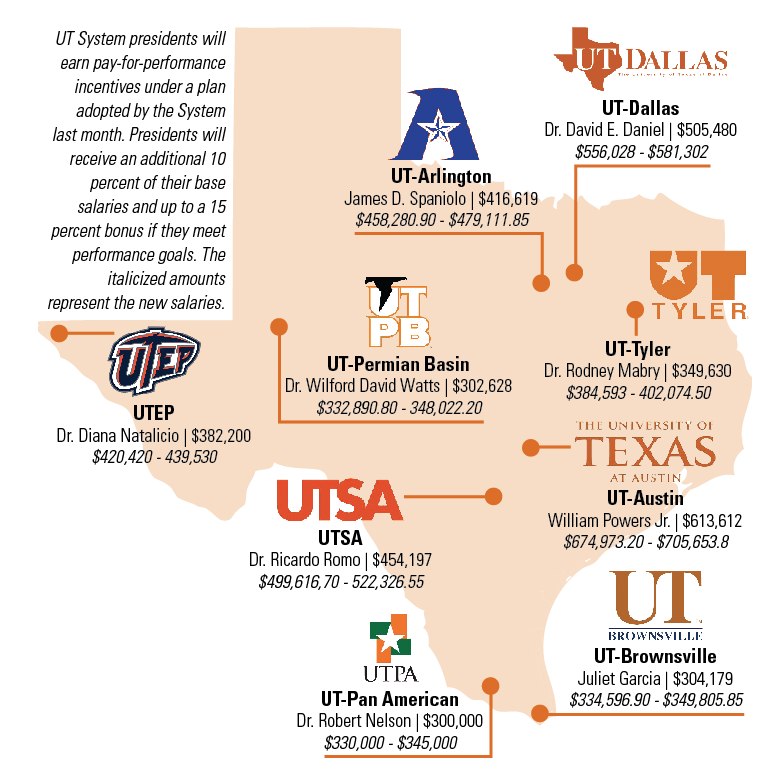UT President William Powers, Jr., one of the state’s highest paid educational executives, could receive a bonus of more than $60,000 under a new incentive pay plan approved by the UT System Board of Regents.
The new incentive pay plan will give UT System presidents an additional 10 percent of their base salary if they meet certain performance goals that could include four-year graduation rates, philanthropic efforts and degree affordability. The pay-for-performance bonuses, common in the business sector, could reach the peak high of 15 percent if all goals are met or surpassed.
Powers is one of the highest paid academic presidents in the UT System, earning $613,612 in base salary. His take-home pay already totals almost $150,000 more than his base salary.
UT spokesperson Gary Susswein said it is too early to predict whether four-year graduation rates, one of the University’s most prominent initiatives, will be part of Powers’ performance metrics, but they remain an important priority for the University. He said the UT System is still developing the metrics to determine how much or how well students are actually being educated.
“President Powers is focused on helping UT System Chancellor Francisco Cigarroa develop the metrics of his incentive plan, which will be created in cooperation with the campus’ goals to create a rational system,” Susswein said.
Some presidents of the System’s health institutions are paid much more than presidents of the academic institutions. UT-MD Anderson Cancer Center President Ronald DePinho’s salary is $1,404,000, but could reach $1,614,600 if awarded a 15 percent bonus.
Last week, UT-Pan American President Robert Nelson told The Texas Tribune he will not accept any bonus he receives through the new incentive pay system. Nelson makes $300,000 a year and is the lowest paid UT System president in official capacity.
He will donate any bonus he earns under the new program to an existing discretionary fund at UT-Pan American, which funds campus speakers and events, according to his interview with the Tribune.
Susswein said Powers, who is already paid more than twice of Nelson’s salary, has not discussed what he will do with his bonus.
Approved by the UT System Board of Regents at its August meeting, the incentive pay plan is one of the nine pillars that make up Cigarroa’s Framework for Advancing Excellence, a UT System action plan adopted last year. The plan calls for compensation strategies to reward and incentivize administration performance.
UT System spokesperson Jenny LaCoste-Caputo said Cigarroa will develop specific metrics and performance goals for each campus with help from Pedro Reyes, executive vice chancellor for academic affairs, and Kenneth Shine, executive vice chancellor for health affairs.
“Our external compensation experts state that this plan was possible thanks to the clarity of purpose of the framework allowing us to measure progress and performance goals,” Cigarroa said during his report on the framework’s progress at the regents’ August meeting.
Texas Association of Business president Bill Hammond said increasing the rate of degree-completion within the state’s largest university system outweighs concerns over the plan’s similarity to bonus distribution models common in the private sector.
“We are not talking about turning the UT System on its head,” he said. “We are talking about a system focused on its decreased productivity rates that provided no incentives to increase these rates.”
The Texas Public Policy Foundation, a non-profit conservative think tank with ties to Gov. Rick Perry, has supported measuring university efficiency systematically in the past.
Chuck DeVore, TPPF’s vice president of communications, said setting the performance goals will benefit the System.
“You typically get more of what you incentivize, so incentivizing the leadership of UT, for example, for higher graduation rates is a good thing,” he said. “However, we believe that perhaps the most important metric is being omitted, which is assessing whether the UT system is doing a good job of actually educating its students.”
The regents have yet to approve performance goals but will review the metrics at their November meeting.
Printed on September 5, 2012 as: "System approves incentive plan"





















